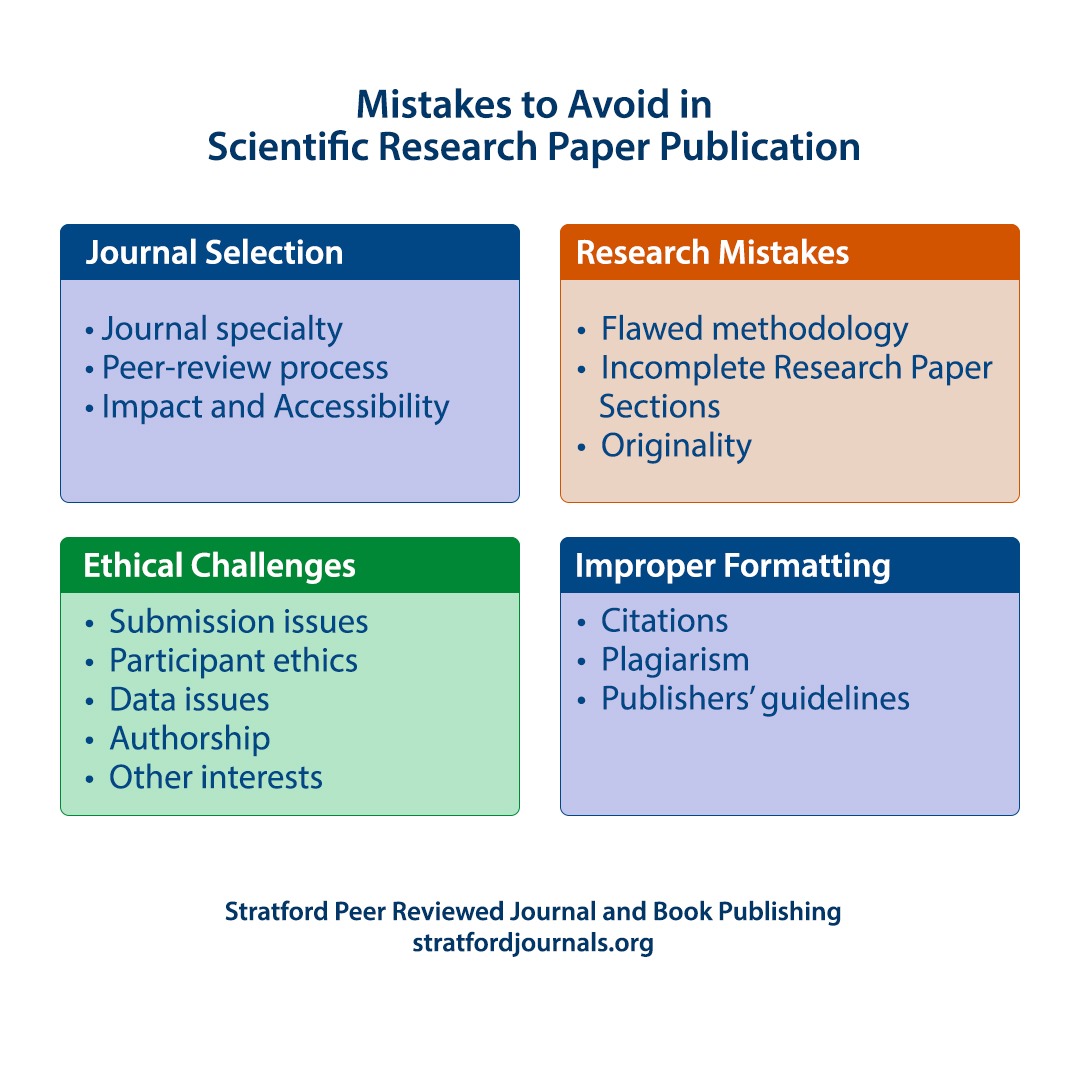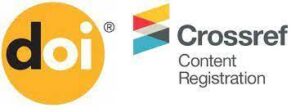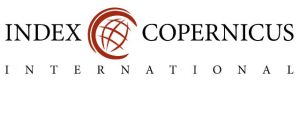
Mistakes to Avoid in Scientific Research Paper Publication
Scientific research paper publication is a is a journey that require passion and patience to accomplish successfully. A common challenge in scientific research is that too many academics send their work to journals to publish them. Unfortunately, these journals have stringent standards which they implement for all the papers they receive. Furthermore, numerous academic competitors make it easy for journals to reject an article and move to the next submission. It would help if you thus endeavored to learn about the manuscript requirements, research guidelines, and ethical standard mistakes that may keep you from success. Below are the mistakes you should avoid when submitting a scientific research paper for publication.
Journal Selection
Aspiring publishers’ first error is sending their work to the wrong publication. Everything is not for everyone. A journal may be perfect for someone else but inappropriate for you.
- Journal specialty: You must ensure that the journal you select admits papers in your specialty area. To be sure that your type of work suits your field, look at the papers a journal has published and confirm whether some of the articles are like yours. Additionally, check on the guidelines to determine the areas the publication covers. At Stratford Journals, we are a multidisciplinary community that accepts industrial, research, scientific, and scholarly work. Case studies, dissertations, Ph.D., research proposals, research papers, informative articles, and review papers are all welcome at Stratford.
- Peer-review process: Choose a journal that has a rigorous, fair, and transparent peer-review process. Always confirm that the selected journal has stipulated procedures for its scientific research paper publication. Stratford Journals has a review process relies on SPRJB reviewer policies involving single-blind, double-blind, or open reviewing. Besides a transparent process, ensure you check what they consider in peer review so you can adhere to it.
- Impact and Accessibility: Scientific research paper publication may be complex, but it would be worse if you undergo that rigorous process only to have minimal visibility. Some journals allow open access so the public can freely access the information. Therefore, you have a higher chance of getting your information out there. Some of Stratford’s Journals are open access for greater access.
Research Mistakes in Writing Scientific Papers
Besides choosing the right journal, you must ensure that your research process is faultless. Often, a journal could reject your work based on whether you committed quantitative or qualitative infractions. Alternatively, it may object to the attention you pay to different sections in the research.
Flawed methodology
Quantitative methodological errors may include a poor description of the methods or materials. If you organize your procedure correctly, you can avoid problems. Furthermore, your research design may be inappropriate for research questions. Your sample size may be too small or biased. When you conduct the research, you should provide standards and have controls.
Sometimes your statistical analysis and data may need to be more appropriate, which could elicit a rejection letter. You may also face rejection when you make qualitative methodological errors or do not report the thematic analysis methods. If your processes have validity and reliability, you might succeed.
Incomplete Research Paper Sections
Sometimes your introduction chapter may need more complete or appropriate information. The length of the chapter may be too long compared to other paper sections. You may need a clear problem statement or research objectives. Therefore, there may be no compelling reason to carry out the study. The reviewers may see no significance in your work. Your background information may need to be revised as well.
Alternatively, your literature review may need to be more comprehensive. If you select papers that are not recent or pick articles unrelated to the topic, you may face hurdles here. Sometimes you may need to discuss your results appropriately. To avoid rejection, you must tie your results to the research objectives, questions, and hypothesis. Not using citations to support your ideas could also land you in trouble. Ensure that your sources are recent and consistent.
The inferences or conclusions you draw from the findings could also be challenging. Not including a follow-up or future research section could result in unwanted outcomes. You may also report problems with illuminating the significance of the findings. Always mention your limitations too.
Originality
The most crucial consideration in scientific research paper publication is originality. Before you submit your work, ask yourself whether you are adding something valuable to the field. Are you contributing to knowledge or merely repeating ideas that already have a scientific consensus? Additionally, the information you provide in your work may be new but insignificant. No one may be interested in your findings, which could undermine your chances of publication.
Ethical Problem in Research Publication
If you are testing your ideas on animals or humans, you need to get approval from the appropriate institutional body and consent from the participants. Having evidence of the above is essential.
Submission issues in scientific research paper publication
- Submitting to more than one journal: Journals only publish original information, so submitting your work to several publishers could increase the probability of duplicate work. Therefore, only submit your work to one journal. You should also declare that your manuscript is only with the targeted journal. Exercise patience when sending applications to avoid this ethical issue.
- Financial conflicts: Academic integrity is pivotal in research. Therefore, if there is a hidden hand that seeks to influence results, then this may jeopardize consequences. If there was a sponsor, ensure you mention them. Independence is a crucial trait in research papers.
Participant ethics
- Human subjects: It is critical to obtain consent from research subjects. First, you must maintain the anonymity of the participant’s medical records or the organizations the individuals belong to. If you need to reveal the organization’s name, ensure you get permission from them. Protecting people’s information is essential. Inform them about the study’s objectives, procedures, possible benefits, and losses. Furthermore, safeguard subjects’ confidentially.
- Vulnerable groups: Children, the economically disadvantaged, prisoners and pregnant women warrant particular concern. You must follow protocol before involving vulnerable subjects. Refrain from causing harm to patients.
Data issues
- Fabrication: One of the worst things researchers can do is falsify data. If you were testing the effectiveness of drugs and you claim that the drugs work when it does not, you could be putting some people in danger. Sometimes omitting critical information may also change outcomes, and that could result in academic misconduct. Many researchers tend to downplay negative results, especially when under pressure.
- Missing sources: Skipping the sources you used may impede research validity. If secondary research was your primary data collection method, consider focusing on it.
Authorship
Authorship is usually a controversial issue because one paper may have many participants. An author is a person who makes a substantial, intellectual contribution to the paper. They may contribute to the study’s analysis, design, and conceptualization. Revising, drawing, and submitting documents are also authorship.
On the other hand, grammar, data collection, and editing do not merit mention. It is reasonable to seek assistance in editing your work. Agree amongst yourselves on who will get credit. Specify whether the person will be a contributor or an author.
Other interests
Aside from financial interests, you may also have challenges with commercial, professional, political, or academic interests. Sometimes if you own stocks in a particular industry, are employed, consult for them, or lecture in that industry, it may impede your objectivity. You may also have political and personal connections around the topic. For instance, you may be married to someone in the pharmaceutical industry when studying a particular drug.
Having any of the above interests does not mean you cannot conduct that research. You need to discuss the issue early with the other researchers. Furthermore, it would help if you did what you can to eliminate any potential impediments to objectivity.
If you need clarification about the implications of conflicts of interest, consult the ethics committee or a researcher from another platform for details. Sometimes editors may object to a conflict of interest, while you may not deem it essential. The worst thing to happen would be hiding this information and having editors discover it themselves.
Improper Formatting
Formatting errors are some of the avoidable mistakes in scientific research paper publication. It would help if you familiarized yourself with publishers’ guidelines. Furthermore, your writing style and grammar need to be by standard expectations.
Citations
One of the most typical and avoidable scientific research paper publication errors is wrong citations. Sometimes, you may need to properly cite your work. Support it with sources whenever you make a statement that is not common sense.
The quality of sources you employ also matters. If you only draw your references from one journal or reference, then that could be a problem. Alternatively, your citations may be outdated. If they do not embody recent findings, you will likely encounter publication challenges. Stay away from referencing from the same authors or geographical settings. Having multiple references can render credibility to your work and heighten publication chances.
Plagiarism
If you borrow ideas from another author and do not cite them, you could be guilty of plagiarism. Plagiarism means using another person’s work and claiming it as yours. Plagiarism is more complex than the last paragraph implies. The most basic understanding of plagiarism is not citing any job and is relatively easy to follow. You may need clarification on sources and place a citation incorrectly. Therefore, the editors may realize that the reference title needs to match the information you are discussing.
Sometimes, not paraphrasing information could make people flag you for plagiarism. The only exception is if you put the information in quotation marks and add the page number or exact paragraph where you drew the information. Use your time well and always reference to avoid these challenges.
On the other hand, you may also commit self-plagiarism when you use information from your own data. There is absolutely no excuse for relying on shortcuts when drafting your manuscript. Even if you have a short deadline, refrain from lifting large chunks of information from previous information without saying so. The same is true even if you have several authors because all the individuals involved in the study need to be included.
Sometimes people call self-plagiarism redundant publication. The issue means having two or more papers with similar discussion points, conclusions, or hypotheses. However, you can make exceptions for abstracts in a meeting. You should still disclose this information in case there may be challenges with publication.
Publishers’ guidelines
It is essential to know the instructions that authors have to adhere to for each publisher. Stratford has several guidelines for its writers:
- Language and format: The website only accepts English papers in MS Word format. Use proper English and proofread your material thoroughly.
- Contact information: Always include your co-authors’ telephone number and email address.
- Cover letter: The cover letter needs to include a summary of the research, including the novelty and research approaches.
- Style: Endeavour to include the title, abstract, references, recommendations, body text, discussion, results, and introduction in your papers.
Summary
Scientific research paper publication may present many obstacles, which, if unaddressed, could result in a rejection. A researcher should thus be aware of those obstacles and avoid making specific issues. The first category of mistakes needs to be corrected journal selection, which is not a good match for your work.
Secondly, you may make research mistakes like improperly described methods and materials, incomplete literature reviews, missing or unsatisfactory problem statements, and conclusions that did not stem from the research.
You may also have formatting challenges that stem from a mismatch between what the journal requires and how you present your information. Ensure you cite all your resources and pick quality references. Additionally, avoid plagiarism in all its permutations and follow the publication requirements in the journal.
Lastly, focus on ethical issues and evade mistakes around them. Falsification of information, submission duplication, unacknowledged authorship, and data-related matters may also need fixing. Overall, following the standards and guidelines your selected journal requires from authors is essential. When you complete the paper, review the above checklist and ascertain that you have adhered to everything.

